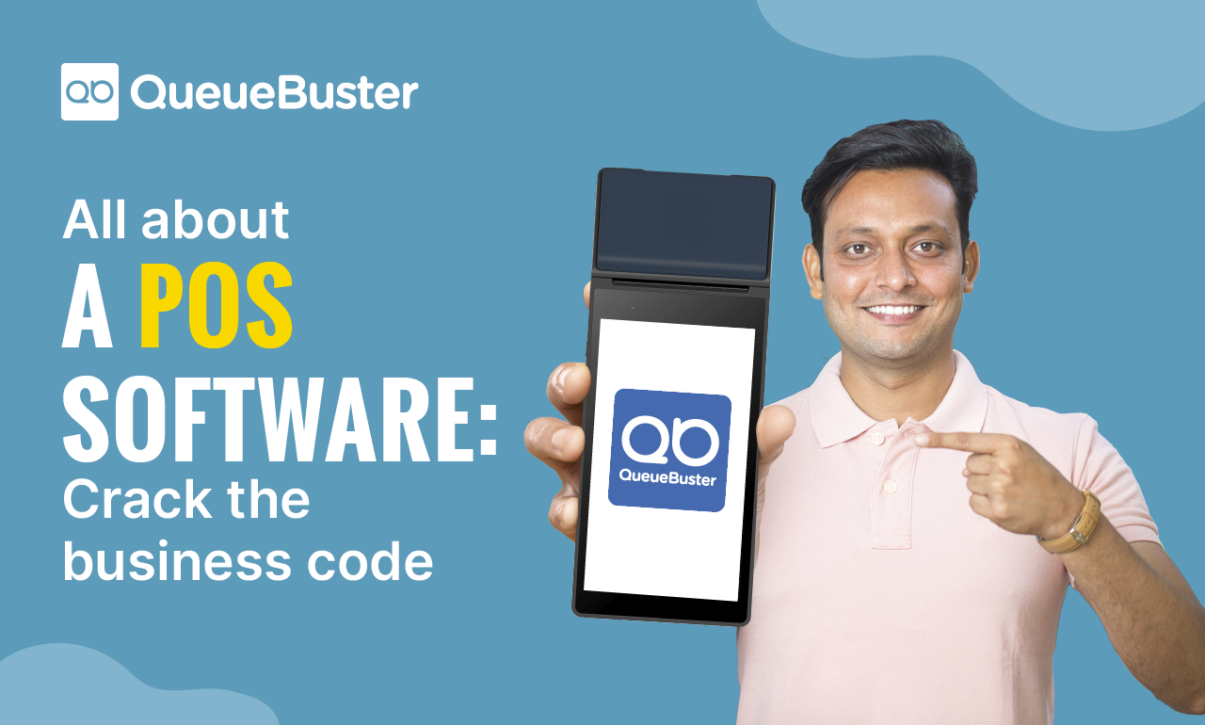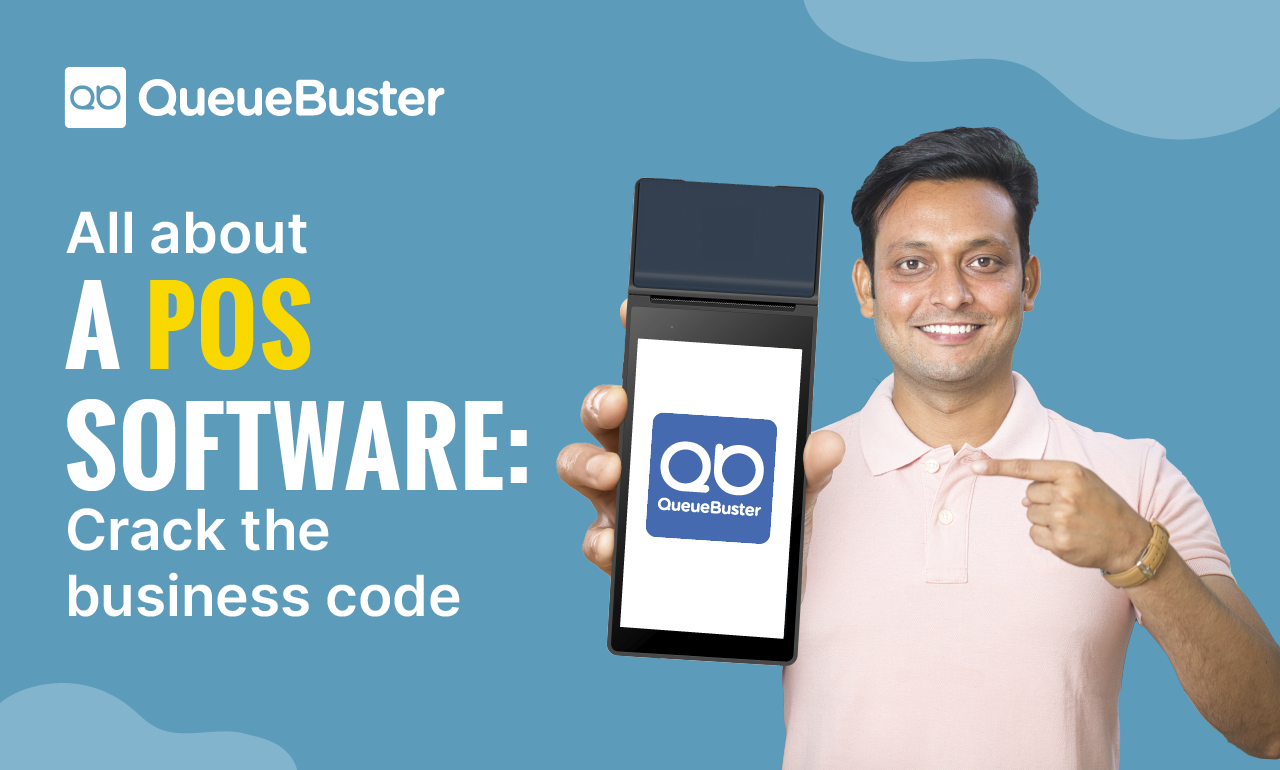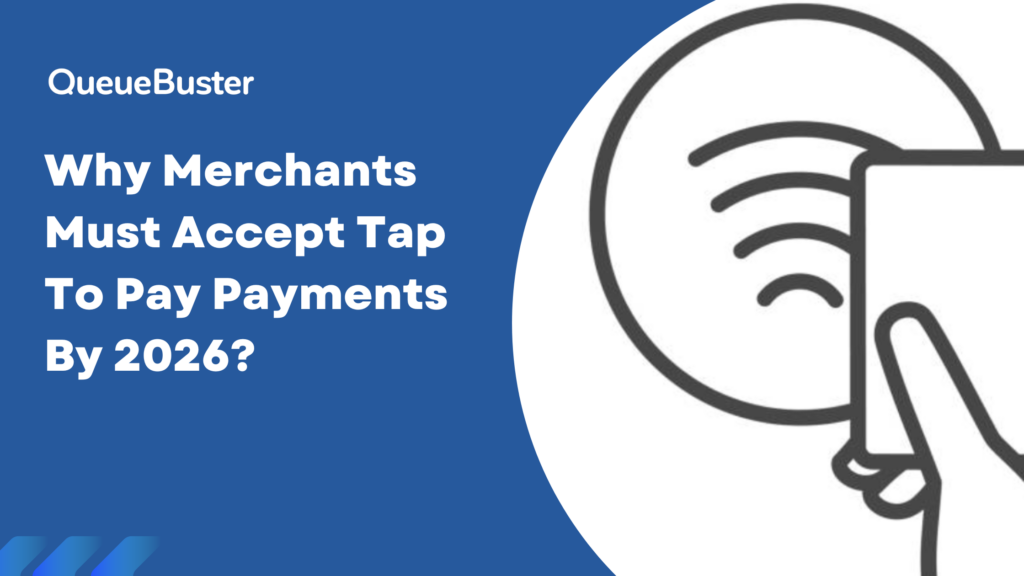
What is POS Software and How Will It Benefit Your Retail Business?
What is POS Software and How Will It Benefit Your Retail Business?

By QueueBuster Team Published: May 6th, 2024
If you own a retail business, you have probably heard of POS (point of sale) software. In layman’s terms, a POS enables your retail business to accept payments and track sales. Think of the cash register or bahi khata as the earliest examples. But they are not easy to maintain when you have a big store, are aspiring to be a larger store or run an online store.
Modern POS software are more advanced and often cloud-based. They are entirely digital, enabling you to check out a buyer from anywhere in the world on the click of a button. All you need is POS software and an android device connected to the internet (any smartphone, PC or tablet will do!)
It’s crucial to know what POS software is, but it’s even more important to understand the benefits it can bring to your retail business.
Table of Contents:
- POS software – What is it?
- Which businesses require POS software?
- What distinguishes POS systems from POS software?
- What hardware does POS software run on?
- What are the benefits of POS software?
- What is the best POS software for retail?
What is a POS Software?
POS software functions as your command hub. At a basic level, it enables you to locate items in your inventory and execute sales. Additionally, more sophisticated POS software comes with added functions like inventory management, customer engagement software, sales reporting, and more.
POS software can be used in a variety of environments, but retail businesses, particularly electronics shops, grocery stores, restaurants, salons and spas, benefit most from their use. This software aids businesses in streamlining their operations and improving their overall efficiencies.
Error: Contact form not found.
Which businesses require POS software?
If you own a physical store, you must connect your POS software to the appropriate hardware in order to accept payments and track sales. You’ll need to install your software on a tablet or smartphone at the very least. Once installed, your tablet or smartphone will function as your POS terminal. A card reader is required to accept in-person payments.
What distinguishes POS systems from POS software?
A POS system is a combination of software and hardware (such as tablets and card readers) that helps a business run more smoothly. You use it to look up products, make sales, check out customers and accept payments.
A POS software is essentially an operating system. The QueueBuster POS app, for example, is POS software. Once it is installed on any connected android device, it becomes your POS system.
What hardware does POS software run on?
If you own a physical store, you must connect your POS software to the appropriate hardware in order to accept payments and track sales. You’ll need to install your software on a tablet or smartphone at the very least. Once installed, your tablet or smartphone will function as your POS terminal. A card reader is required to accept in-person payments.
What are the benefits of POS software?
Here are 12 reasons how a retail business would be immensely benefitted from purchasing POS software:
1. Easy Product Cataloging/ Product Cataloguing Made Simple:
In any service-based retail business, good product catalogue management leads to a delightful shopping experience for customers. POS software that manages product catalogues with SKU-level information on prices, taxes, and charges makes this process a breeze. For example, the QB eStore takes your business online and enables digital ordering, a smart way for your customers to order contactless and queue less.
2. Faster Payment processing:
A POS software helps make payments faster and more efficient. Simply select the products that the consumer wishes to purchase. The software automatically calculates the price. It enables multiple payment channels including cash, card, online wallets, UPI, vouchers, credit notes, and cheques. The invoice can be emailed or printed on the spot with a receipt printer. Voila, its done!
3. Improved Employee Management:
A POS software, such as QueueBuster, will show employee performance stats- sales per employee, hours logged in and sales per time slot. With this data, you can create schedules, optimise employee time on the floor, and provide ongoing training.
4. Better Inventory management:
POS software can assist businesses in real-time inventory tracking, including automatic alerts when inventory is low. When compared to manual inventory tracking, this saves time and has fewer errors.
5. Simple Customer Billing:
POS software allows you to issue invoices, record purchase information, and sell much more quickly than if you did it manually. Allow the accounting team to thank you each month!
6. CRM and Customer Loyalty:
POS software allows a retail business to track customer information such as contact information and purchase history. Manage your customers and reward them with loyalty points and offers based on their purchase history. Or go one step further by running targeted marketing campaigns to increase sales.
7. One-click Promotions & Discounts:
Give spot discounts on specific products or apply them at the customer level to ensure a positive shopping experience with every purchase.
8. Increased mobility and flexibility:
Cloud-based POS software like QueueBuster allows businesses to access sales and inventory data from any location or device.
9. Hassle-free Business expansion:
On expanding your business to a new location, simply add the new outlet with the click of a button. Expanding to a new country, POS will enable you to go global by accepting payments in any currency.
10. Sales tracking and management:
Businesses can use POS software to track and manage their sales in real-time. This includes the ability to monitor inventory levels, generate invoices, and accept payments.
11. Enhanced Security:
Cloud-based POS software ensures that your data is always backed up and encrypted. Most softwares support two-factor authentication which reduces the risk of malicious users infiltrating your system. Furthermore, the administrator can quickly grant or deny access to users.
12. Reporting and analytics:
POS software provides businesses with detailed reporting and analytics on their sales and inventory. This can assist businesses in making more informed decisions about their operations and identifying opportunities for growth.
According to an Intuit Market Research study, a retailer with $300,000 in revenue can reduce costs by nearly 10%, saving $30,000 per year by implementing a POS system. It’s a great way to save money and reinvest it in other aspects of your business.
In conclusion, POS software can help businesses to improve their efficiency, reduce costs, save time, reduce errors, increase their sales, and provide a better customer experience. Now that you have a deeper understanding of POS software, you’re ready to buy the right POS solution for your retail business!
Error: Contact form not found.
What is the best POS software for retail?
While Point of Sale (POS) software is a must-have for retail business but it’s also important to note that not all POS softwares are created equal. Hence, it is important to research and compares all different options before making a purchase. A good way to get started is to look for a free trial or demo version of the software. QueueBuster provides a 30-day free trial which will allow you to test the features and see how QB can work with your specific business needs. Book a demo with QB now!
If you are interested in learning more about POS software, we would be happy to answer any questions you may have.
Popular Posts

MEWA India 2026: Showcasing QueueBuster POS to the Global Dry Fruits Industry
MEWA India 2026 was not just another industry event for us, it […]

Why Merchants Must Accept Tap to Pay Payments by 2026
The way customers pay has changed rapidly over the last few years […]